- Home
- Peter Grainger
Lane: A Case For Willows And Lane Page 11
Lane: A Case For Willows And Lane Read online
Page 11
‘Unless you let at least one other officer see what you claim to have found, you’ll be in a spot of bother yourself. For all we know, that folder is empty and won’t have anything in it until you get back to the station. If you think I won’t stand up and say that, try me.’
Cooper weighed it up, and must have concluded that she had a point. He held the folder towards Jennifer Spall and she took it. Inside were pages of handwritten notes. She could see no evidential material as such but it took her no more than a few seconds to realise that what was written here did concern Operation Landing Net; she recognised names, places and dates.
She nodded and handed the folder back to Cooper. It was a moment before she could bring herself to return Marie Willows’ stare, and then she said, ‘It’s probably nothing,’ with a good deal more confidence than she actually felt.
Ten thousand years, the anthropologists say, since we began the long process of withdrawing from the natural world that fashioned us and at the same time began the opposing process, the one in which we re-shaped and re-fashioned that world to suit our needs and wishes. First, they say, we left the forests and began to wander the plains of Africa; then, after the most recent amelioration of the climate, we found our way north. Eventually, perhaps tired of the wandering, we decided to stay in one place, plant crops and build permanent dwellings. As a species unlike any other, if all this is correct, we took control of our own ecological destiny.
But a few thousand years is no more than the blinking of an eye. Before that, our ancestors walked the earth for many hundreds of thousands of years. What they learned, what nature taught them, though it might be forgotten sometimes, has not been erased – it is printed too deeply in our DNA. At the foot of a pine tree, in a tiny clearing, Lane and Emily Willows sat down. They could smell that dampness of soil that is always present in the shade of woods and forests, and their fingers pressed pine needles, little twigs and last year’s cones into the humus of time. They began to remember.
The silence that Lane had asked for came of its own accord, and so, when a bird clattered out of the tree above – a wood pigeon no doubt, as it invariably is – both women flinched, ducked and felt the simultaneous surge of adrenalin through arteries and veins. In a gesture as ancient almost as the unfurling instincts, Lane touched Emily Willows for the second time, a brief reassurance of hand on arm; Emily looked at her then, their faces only a foot or two apart, and she could see starlight in the younger woman’s eyes.
Seconds or maybe it was minutes later – the divisions on a clock have little meaning in this other, older world – another creature, frozen perhaps by their unexpected arrival, scuttled away into the darkness. Two legs or four? It was impossible to say. Hunter or hunted? The answer was the same.
It was Emily who first saw the light. Without saying a word, she drew Lane’s attention to it, the beam away down the hill, moving back and forth several times in an arc of ninety degrees. At that point the light was not coming forward at all – the men, if it was still the two of them, had stopped.
Lane whispered, ‘They’ve reached the car.’
Emily thought, we seemed to go a long way but that doesn’t look much more than a hundred yards – maybe it’s two hundred but it isn’t far enough. Why didn’t we keep going? Why aren’t we still going? But Lane had worked it out, hadn’t she? Stay in the cover, don’t get caught on the open ground. If Lane can see in the dark, perhaps one of the men can. Perhaps both of them can – and they have a torch, too.
It was the torch itself that had Lane’s attention. Not a silly, pencil-beam thing, that torch, but a proper one that penetrated far into the night with a narrow, intense spotlight. Once caught in it, escape would be difficult, especially if the two of them were still there, one holding the beam on the target while the other moved in. Small she knew about, she had been close enough for long enough to make an assessment of the threat he posed, but the other one she had only glimpsed. Younger, smaller – the one with the odd name, Jami, who had been waiting in the Volvo out in the road. Was he just a driver, made to follow them by the bigger and much more dangerous man who had another gun? Perhaps, but that gun must have been in the car, and that meant that this driver was no innocent.
Surely both of these were city sorts, brought in to do a job before going back to their grubby streets. They were not likely to be comfortable wandering about here in the dark, and so the torch might be the key. Without that, the odds would be much more evenly spread. But as she thought it through and planned, Lane was aware of the other question that buzzed about inside like an annoying fly – why? The longer this pursuit went on, the less sense it made.
OK, Small was miffed about his face. It must have stung a bit but the cleaners you find by the loo aren’t lethal. The effects ought to be wearing off by now – he ought to be seeing sense, at least out of his good eye. Small had seen her shoot and drive, so he had some idea what he was up against. He knew therefore that this wasn’t going to be straightforward, and yet here he was in the forest, still looking. It could not be for Emily; whatever had been going on there was well and truly blown, and the other one, Mr Hepatitis C at the very least, was under arrest if he hadn’t bled to death. So why weren’t these two doing ninety miles an hour somewhere east of Reading?
Lane brushed it away and refocused on the light, still where they had left the car. People have fanciful ideas about what one can do with a handgun, ideas that come from Hollywood or the latest television drama; in those, from twenty yards or more, Lane would shoot out the torch at the first attempt. The reality is that even from a few feet away, one would need to be lucky. She could aim behind the torch, of course, hoping to hit the bigger target but that too was potentially messy. As these men had followed them this far, clearly intent on doing harm, she could justify it in a courtroom, but it was still potentially messy, and she preferred more elegant solutions.
And there was still the problem of the number of shots remaining. Presumably, Small could count to two; if she missed, as she might, she would have given their position away and reduced their main deterrent’s effectiveness by fifty per cent… No. Staying hidden was their best option, and that meant letting the men make the next move.
When it came, the move was entirely predictable. The torchlight began to edge a little to the right as someone made their way around the heap of branches. Lane thought, once they are around it and back on the path, they will pause again and shine the beam along the path, getting their bearings – no more than twenty seconds later, that’s what happened. Beside her she felt Emily Willows stiffen and catch her breath as she realised what was taking place.
Lane listened intently as the light began to move again, trying to catch the sound of voices – that way she would know how many they had to deal with now. Nothing yet, but she was sure that if one of them was moving through the trees parallel to the path, she would be hearing that by now; either both were on the path or there was only one of them. With her forefinger on her lips, she made the universal gesture for silence and Emily nodded her understanding.
The light moved forward slowly. Every few yards it dipped downwards and paused; Lane realised what they were doing – looking for signs that the women had passed that way. She hadn’t expected that, being tracked. There might be signs. The grass was already wet with dew, wet enough to show where feet had trodden, and once again she re-evaluated their situation. If one of these was Tonto or a keen boy scout, they might find the spot where the two of them had left the footpath, and then the rules of engagement that she had set moments ago would no longer apply. Lane felt along her waistband and made sure that the gun was not caught up at all.
The torch’s beam halted at that point, and then Lane could hear voices kept low – both men were present on the path no more than thirty yards distant. Then the light moved forward again, still on the path and still dipping down occasionally, which must mean that they had not found the place where the women had left it. Gradually the distance between the tw
o pairs increased as the pursuers made their way to the edge of the forest. If it were me, thought Lane, I’d stop there – and that’s exactly what they did.
For Emily Willows, these last few minutes had been the most nightmarish of the entire day. She could never have imagined that being hit, threatened, chased and shot at would be preferable to hiding behind a tree, but they were. There is something primeval in being stalked by a predator; one feels terrifyingly alive when one is horribly close to extinction.
She watched Lane inch her way round the tree trunk so that she could see where the men had stopped, and she had seen the hand go surreptitiously to the gun tucked into the waistband of the jeans. All women younger than herself wore jeans all the time, of course. A stupid thought, and she told herself to concentrate and focus, focus like Lane did on the next thing that needed to be done to stay safe for another few minutes. She, Lane, seemed to be awfully good at all this, and could not have been a banker or a hedge-fund manager in the City, unless she had done lots of those outward-bound management training courses that Ronald had despised with a passion. He used to say, they’d be better off learning how to use a calculator properly rather than how to climb a damned rock. The only time she had heard him swear worse than that was the night when Tony Blair got elected for the third time. This will be the end of us, he had said, and it very nearly was…
Lane signalled to her then, move, get behind me, and the terror returned. Something else must be happening now.
If Assistant Chief Constable Russell had not been present, Hannaford would probably have been awkward about sharing the contents of Robert Willows’ file – and that’s why Harley had made sure that the ACC was present before he asked to see it. Once he had it in his hands, Harley made a point of going to his desk, sitting down and reading through it page by page, slowly and methodically. The other three men present – Russell, Hannaford and Cooper had no choice but to watch and wait because Harley was simply doing his job then.
When he had done, Harley turned the papers over, tapped them together on the surface of his desk and then ran his left thumb over the edges again, as if he was refreshing his memory or mentally summarising the contents. Then he said, ‘There is, in my professional opinion, nothing significant here. Obviously Sergeant Willows has been thinking about Landing Net at home, and, like any decent officer, he’s made some notes.’
Hannaford said to Russell, ‘There are names, dates and places in there. In the wrong hands, that material could prejudice a case – especially a case like this one.’
ACC Russell didn’t answer straight away. He walked to the window of his office and with thumb and finger he made a gap in the blinds. Bodmin lay below and to the west of the police headquarters. With the clear skies above and the lights of the town spread out below, the view, he realised for the first time since he had moved into this office, was a pretty one.
With the merest glance at Harley as he turned back to the other officers in the room, Russell said, ‘I don’t agree. Superintendent, has everything in this folder been disclosed to the defence, as far as you are aware?’
‘It will have been, sir.’
Harley certainly sounded confident.
Russell continued, ‘So there is nothing in this that could form the foundation of a challenge? Nothing that could even remotely be used to delay court proceedings because of non-disclosure?’
‘No, sir.’
‘And am I also right in thinking that Sergeant Willows’ role in Landing Net has been largely an administrative one. He has not come into direct contact with any of the persons of interest or with any of the people whose trials begin on Monday?’
‘Yes, sir, that’s correct. He has been one of three officers responsible for collating and preserving evidence. He hasn’t-’
‘That’s the whole bloody point! This kidnapping is a blatant attempt to interfere with evidence, so who better to target than the evidence officer?’
Hannaford’s interruption left Superintendent Harley open mouthed in mid-sentence. Russell didn’t respond immediately – he closed the blind and then went back to his desk and sat down again.
‘Yes. I think we all understand how Willows and his family came to be a target. But what exactly do you think that’ pointing a finger towards the folder on Harley’s desk, ‘is evidence of? Because it contains no evidence pertinent to the trial. It has some value as intelligence, yes, but no evidence. There is no documentation here, no copies of anything that should not have been removed from the vaults. I appreciate that if you’ve been out of the field for a while, you can lose sight of that distinction, but all I can see here is ‘evidence’ of a good, keen detective doing some unpaid overtime.’
The barb about being out of touch with real police investigations as opposed to conducting investigations into the police went home; Hannaford’s face went pale with anger, and Harley looked at ACC Russell. The senior officer’s gaze never wavered as Hannaford stepped forward, picked up the folder and left the room, followed by Cooper. It was easy to mock the salaries earned by the shiniest uniforms but on this occasion the Assistant Chief Constable had backed his man and earned some respect as well.
Russell indicated that he wanted the door closed before he spoke again, and Harley complied. Then Russell said, ‘He’s off to report to whomever it is he reports to. I expect I’ll get another call as a result.’
‘Thank you, sir.’
Harley didn’t need to explain.
‘If that folder had contained a single bloody photocopy – even someone’s petrol receipt or a claim for cheeseburger and chips, Jack…’
‘Yes, I know, sir.’
‘When this is over, tell Willows he’s an idiot.’
‘Yes, sir. Thank you again, sir.’
Chapter Thirteen
The light moved forward again, out into whatever open space lay beyond the edge of the forest, but Lane ignored the temptation to hope – hope was a distraction. Instead, she simply watched and waited. Sure enough, after it had gone perhaps twenty yards, the light stopped and was then turned back onto the trees. Whoever had hold of it shone the beam slowly and systematically along the border between the woodland and the open space – they were thinking and evaluating as they did that. Would the two women have crossed this or would they have stayed in the cover of the trees? The most likely answer was the second option and therefore Lane wondered whether she had been mistaken in choosing it – but again, no time for regret or self-recrimination. Evasion was all that was required.
Had they gone left or right off the path, though? The men could only guess unless a sign could be found, and she knew that they had missed any sign that had been left. So the choices open to their pursuers were either to wait and listen, to choose a direction and search together or to separate and search, one in the trees to the left of the path and the other in the trees to the right.
Lane was certain that she could out-wait them. If they began a search, only one of them had a torch but once away from the light the sky above was bright enough for her to see, and it might be the same for one of them. Staying in the cover of the trees was the best way of avoiding the torch-beam but if they did have to move, there would be sounds that would give away their progress. In the open they could move much more quietly, but then the light, once it found them, would have them at its mercy. Emily would not be able to run, and then, Lane knew, she would have to take them on.
The light started to move slowly to the right along the edge of the wood, beginning a systematic sweeping across the trunks of the trees and pausing occasionally. Right was away from them, which was good, but it was impossible to say whether both men were with the torch now. Behind her, Lane heard Emily Willows whispering, and she turned her head to shush her again.
Emily said, ‘They’re going away!’
‘One of them is. Wait and listen.’
The light continued to move slowly away, like that of a small boat that had set sail on a dark sea. For a long time, maybe as much as thre
e or four minutes, there was an utter silence in the wood – it was long enough and quiet enough for Lane to begin to conclude that both men had gone with the light. And then, somewhere close by, a small twig snapped.
Biologists and behaviourists call it horripilation – the rest of us just say that our hair stood on end. It’s an innate and ancient response to danger, immediate and life-threatening danger, and you can see it at work in your dog or your cat. The fur rises and the animal turns side-on to confront the enemy. The potential victim looks then a little larger, a little more of a handful, and in this way a small percentage survive to live and enlarge themselves another day. With our thinned-out fur, most humans probably look more ridiculous than deadly, but Lane, nevertheless, felt the hairs on her arms prickle. One more sound and she would know for certain that one of the men had come back along the path.
And there it was – another twig breaking, and then another, very faintly. As far as Lane could tell, one of the men was back near the point where she and Emily Willows had left the path. A coincidence? Or had they found that point of exit and deliberately moved on from it, planning to come back as quietly as possible to listen for the women who were likely to be hiding nearby? If so, that was clever, and she had underestimated at least one of them. How, too, had he managed to get back to the place with no torch? Perhaps they had left some sort of a marker, a stick on the path, as she might have done herself.
What next? After listening, he might decide to move into the wood and the chances were that he would head towards them – he was no more than thirty yards away now. She had the gun and an element of surprise but no means of aiming for a target until he was within feet of them and then it would almost certainly be too late. And which of them was it out there? She was not going to defeat Small in hand-to-hand – he was simply too tall, too heavy and too strong. Wait and risk him getting even closer, or go now?

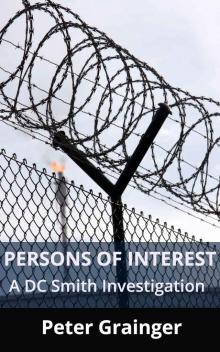 Persons of Interest
Persons of Interest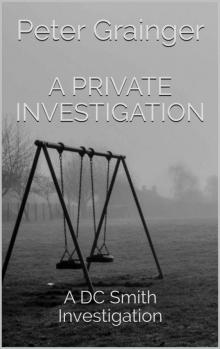 A Private Investigation
A Private Investigation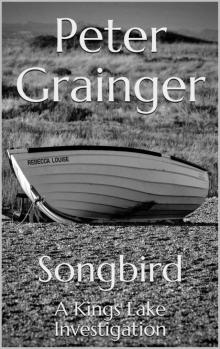 Songbird
Songbird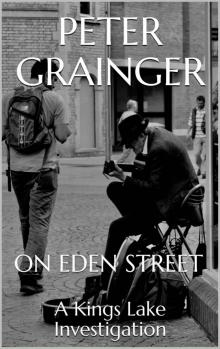 On Eden Street
On Eden Street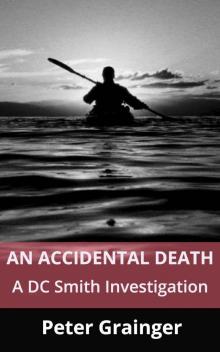 An Accidental Death
An Accidental Death Time and Tide
Time and Tide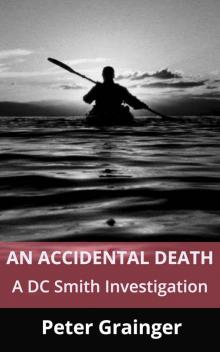 An Accidental Death: A DC Smith Investigation
An Accidental Death: A DC Smith Investigation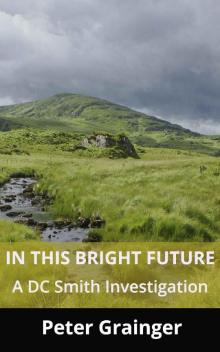 In This Bright Future
In This Bright Future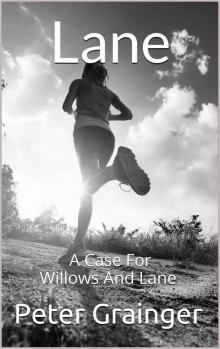 Lane: A Case For Willows And Lane
Lane: A Case For Willows And Lane The Rags of Time: A DC Smith Investigation
The Rags of Time: A DC Smith Investigation Luck and Judgement
Luck and Judgement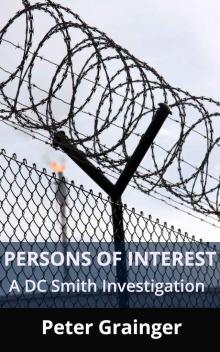 Persons of Interest: A DC Smith Investigation
Persons of Interest: A DC Smith Investigation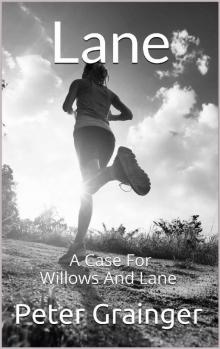 Lane
Lane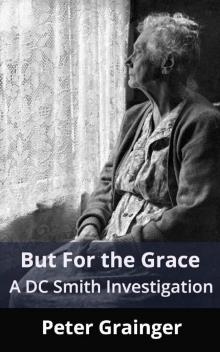 But For The Grace
But For The Grace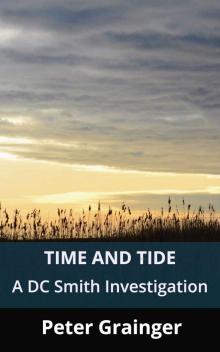 Time and Tide: A DC Smith Investigation
Time and Tide: A DC Smith Investigation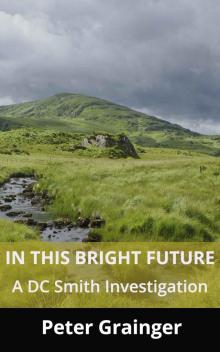 In This Bright Future: A DC Smith Investigation
In This Bright Future: A DC Smith Investigation The Rags of Time
The Rags of Time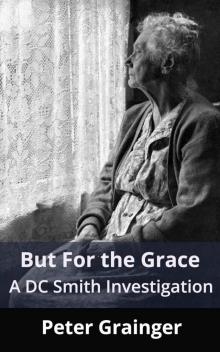 But For The Grace: A DC Smith Investigation
But For The Grace: A DC Smith Investigation Luck and Judgement: A DC Smith Investigation
Luck and Judgement: A DC Smith Investigation